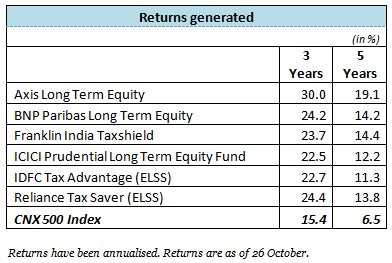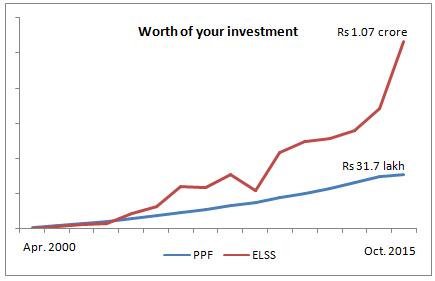There are several investment avenues doubling up as tax-savers under Section 80C of the Income Tax Act’s capacious umbrella. And at Rs. 1,50,000, the Section 80C limit is no mean amount – it often forms a good bit of your total investments. Therefore, the choices you make in order to save on taxes should also help you build wealth over the long term.
One must-have is life insurance. But there is certainly no need to keep adding to the line of policies you have just to save on taxes. One term insurance policy that has an adequate sum assured relative to your income will do. Then there is the Employee Provident Fund (EPF), which most salaried individuals will also have.
So, what about the remaining amount of that Rs. 1,50,000 that you can claim? If you want smart investment options for the long term, you should consider Equity Linked Saving Schemes (ELSS) as a part of your tax-saving portfolio. It has three main factors rooting for it.
Building wealth
One, an ELSS has a relatively shorter lock-in period of three years. The ever-popular Public Provident Fund (PPF) has a minimum lock-in of 15 years, and allows only conditional withdrawal before that. The EPF is usually locked in for the term of your employment. Tax-saving Fixed Deposits, or the National Savings Certificate (NSC) are locked in for five years or more. The National Pension Scheme (NPS) is locked in until you reach 60 years of age, and only allows conditional withdrawal.
Two, an ELSS does not suffer from any taxes, whether on dividend paid or at the time of redemption. Agreed, both the PPF and the EPF don’t suffer taxes on interest or redemption either. But interest earned on tax-saving deposits and the NSC are taxed. The NPS is taxed at the time of redemption.

Three, an ELSS delivers superior returns over the long term. An ELSS invests almost its entire portfolio in equities, which is a superior asset class. For this reason, ELSS delivers better returns than the traditional tax-saving options (provident fund, deposits, NSC etc), which are pure-debt instruments. Debt, as most of you know, does not always beat inflation too.
What an ELSS does require is for you to take higher risk than traditional options. In return for this, you are certainly rewarded well. Take a look at the graph below. It shows you where a yearly investment of Rs. 1 lakh in the PPF over the past 15 years would place you now, against a similar investment in Franklin India Taxshield, a moderate risk ELSS. We have considered 15 years as that is the minimum period for a PPF investment.

Still wondering how to save on taxes wisely, then?
Choose the best
The dozens of ELSS funds available can make it a confusing exercise to zero in on one. ELSS funds can invest across market capitalisations and have a mix of investing styles, making it hard to differentiate between their risk-return profiles, or judge performance. You can thus choose from the six ELSS funds in our Select Funds list. Here is a brief profile of each of these.
This fund scores very well on the volatility aspect, with its standard deviation of returns far lower than the average of its category. Barring a couple, the fund also scores the best on the metric of risk-adjusted returns. BNP Paribas Long Term Equity Fund is suitable for investors with a moderate risk appetite.
The fund began to improve on its performance from 2010 onwards; since then, on a three-year rolling return basis, it has done better than its category around 70 per cent of the time. In the one, three, and five-year periods, the fund’s returns are 2 to 4 percentage points above its category.
Benchmarked against the CNX 200 index, the fund tends towards large-cap (those with a market capitalisation of over Rs. 12,000 crore) stocks, which make up around 70-75 per cent of its portfolio. As with most other funds from the BNP Paribas stable, this fund too is betting big on the telecom sector taking off.
This fund sports a shining record of consistent, low volatile performance. On a three-year rolling return over the past five years, the fund has bettered its benchmark, CNX 500, as well as its category, almost all the time. This is despite the fund’s penchant for large-cap stocks, which are stable performers, unlike other consistent peers’ preference for mid-cap stocks during rising markets. It is extremely adept at containing losses, and scores well compared to its category on risk-adjusted returns. The fund, therefore, suits those with a moderate risk profile.
The majority of Franklin India Taxshield’s portfolio belongs to the large-cap space. Even in its mid-cap picks, the fund opts for quality names and not risky ones. A limited portfolio churn and a focus on quality is what sets this fund apart.
IDFC Tax Advantage is benchmarked against the BSE 200 index, and has outperformed it in the one, three, and five year periods by a solid margin of five to 10 percentage points. The fund takes higher cash calls, up to 10 per cent of its portfolio, during uncertain markets or when markets turn expensive. IDFC Tax Advantage is among the best in its category at keeping its volatility low, while maintaining higher risk-adjusted returns. The fund also mostly sticks to large-cap bets. For investors with a moderate risk appetite, the fund is a good fit.
On a three-year rolling return over the past five years, the fund has been better than its category average a good 90 per cent on the time. The fund, however, takes somewhat concentrated bets and holds a relatively compact portfolio of around 35 stocks.
This fund holds an impeccable record of beating its benchmark; on a three-year rolling return basis in the past five years, the fund has stayed ahead of the BSE 200 at all times. Its five-year return of 19.1 per cent is far above the BSE 200’s 6.2 per cent. In fact, in the one, three, and five year periods, the fund’s returns have been more than 10 percentage points better than the BSE 200’s. Its risk-adjusted returns are among the best in its category.
Even so, comparatively, the fund slips up on the volatility metric. Its usually low cash calls, and its recent predilection for mid-cap stocks together make Axis Long Term Equity suitable for investors with a higher risk appetite. The fund’s top stock holdings can also get quite concentrated, with the top five stocks accounting for just about a third of the portfolio.
ICICI Pru Long Tem Equity (Tax Saving)
This is another fund for those with a higher risk appetite. ICICI Pru Long Term Equity allocates a good 25-30 per cent of its portfolio towards mid-cap stocks. The fund is benchmarked to the CNX 500 and has beaten it comfortably by two to six percentage points across time-frames. Over the longer term, the fund also manages to outperform its category consistently. Its volatility, however, is on the higher side. During bearish markets, the fund does not really do better than its category at containing losses. Portfolio churn, too, is much more when compared to peers. The fund takes slightly contrarian views as well, and does not always go with the flow of the market.
Reliance Tax Saver is the most volatile of the tax-saving funds. Even though its benchmark is the BSE 100, it often puts nearly half its portfolio in mid-cap and small-cap stocks. This risk is not without reward; over the past five years, Reliance Tax Saver has beaten even the broader CNX 500 index more than 95 per cent of the time on a three-year rolling return basis. While its longer term record is intact, the fund suffers from brief periods of underperformance such as in 2009 and 2013. In the past six months too, the fund has not matched up to its peers, thanks to its wholly contrarian bets. Therefore, the fund suits only those with a high risk appetite, and who can stomach sharp declines followed by a good outperformance over the long term.
FundsIndia’s Research team has, to the best of its ability, taken into account various factors – both quantitative measures and qualitative assessments, in an unbiased manner, while choosing the fund(s) mentioned above. However, they carry unknown risks and uncertainties linked to broad markets, as well as analysts’ expectations about future events. They should not, therefore, be the sole basis of investment decisions. To know how to read our weekly fund reviews, please click here.









Hi bhavna, what are you think about Motilaloswal most focused long term ELSS fund whose portfolios are approximately similar as Motilaloswal most focused 35 fund who is top performer of diversified equaty fund yet whose track record is not long.
Hi Vivesh,
The Motilal tax-saver fund, as you have said, has a short track record. This fund began only in January 2015, so that is not even one year of a performance history. We would need a longer period to take an informed call on the fund. The fund is managed in a manner similar to the other Motilal equity funds – a compact portfolio, high-conviction, long-term bets. While the fund currently has almost its entire portfolio in large-cap stocks, its mandate does not really restrict it to doing so – the fund can invest across market capitalisations, and its benchmark is the CNX 500, which is a very broad index. Hope you found this useful.
Thanks, Bhavana
Hi bhavna, what are you think about Motilaloswal most focused long term ELSS fund , number of stocks in this fund is 19 oriented large cap,
Portfolio of this fund is approximate similar as Motilaloswal most focused 35 fund who is large cap oriented diversified equty fund and top performer of last year in category of diversified equity fund yet track record of these funds are not long.
Hi bhavna, what are you think about Motilaloswal most focused long term ELSS fund whose portfolios are approximately similar as Motilaloswal most focused 35 fund who is top performer of diversified equaty fund yet whose track record is not long.
Hi Vivesh,
The Motilal tax-saver fund, as you have said, has a short track record. This fund began only in January 2015, so that is not even one year of a performance history. We would need a longer period to take an informed call on the fund. The fund is managed in a manner similar to the other Motilal equity funds – a compact portfolio, high-conviction, long-term bets. While the fund currently has almost its entire portfolio in large-cap stocks, its mandate does not really restrict it to doing so – the fund can invest across market capitalisations, and its benchmark is the CNX 500, which is a very broad index. Hope you found this useful.
Thanks, Bhavana
Hi bhavna, what are you think about Motilaloswal most focused long term ELSS fund , number of stocks in this fund is 19 oriented large cap,
Portfolio of this fund is approximate similar as Motilaloswal most focused 35 fund who is large cap oriented diversified equty fund and top performer of last year in category of diversified equity fund yet track record of these funds are not long.
Hi bhavana
This is a very good and detailed article about tax saving funds. Can you suggest me the best Elss fund scheme to secure my future?
It depends on the risk appetite. You can choose from any of the funds we’ve explained in this post.
Thanks,
Bhavana
if i have a good risk taking appetite, then which elss is best
Hi Sanjay,
You can choose any of our Tax Saving Funds – High Risk, available here: http://www.fundsindia.com/select-funds. The higher risk in these funds comes from their higher exposure to mid-cap and small-cap stocks than the funds listed under ‘Moderate Risk’.
Thanks,
Bhavana
Hi bhavana
This is a very good and detailed article about tax saving funds. Can you suggest me the best Elss fund scheme to secure my future?
It depends on the risk appetite. You can choose from any of the funds we’ve explained in this post.
Thanks,
Bhavana
if i have a good risk taking appetite, then which elss is best
Hi Sanjay,
You can choose any of our Tax Saving Funds – High Risk, available here: http://www.fundsindia.com/select-funds. The higher risk in these funds comes from their higher exposure to mid-cap and small-cap stocks than the funds listed under ‘Moderate Risk’.
Thanks,
Bhavana
I invested in IPru ELSS 2 years back . Have they changed the name to ICICI Pru Long Tem Equity (Tax Saving)?
You recommend many other funds. I have a horizon of 25 years. Do I continue with it or switch to Axis or IDFC?
Hi Rohit,
Yes, ICICI Prudential renamed its tax saving fund to ICICI Prudential Long Term Equity (Tax Saving). In this post, we’ve listed and explained the ELSS funds that form a part of our Select Funds list. You need not switch into another ELSS fund just because it has been listed here. The ICICI Pru fund is perfectly fine as you have a very long-term horizon.
I invested in IPru ELSS 2 years back . Have they changed the name to ICICI Pru Long Tem Equity (Tax Saving)?
You recommend many other funds. I have a horizon of 25 years. Do I continue with it or switch to Axis or IDFC?
Hi Rohit,
Yes, ICICI Prudential renamed its tax saving fund to ICICI Prudential Long Term Equity (Tax Saving). In this post, we’ve listed and explained the ELSS funds that form a part of our Select Funds list. You need not switch into another ELSS fund just because it has been listed here. The ICICI Pru fund is perfectly fine as you have a very long-term horizon.
Hello,
I am new to mutual funds
want to invest for next 3 years for getting high returns and looking for ELSS schemes for around 25000 amount..
could you please suggest me which funds i should invest?
Hello Bhushan,
Since you are new to mutual funds, it’s better that you start out with relatively moderate risk funds. You can invest in IDFC Tax Advantage (ELSS), Franklin India Taxshield or BNP Paribas Long Term Equity – these three tax-saving funds require a moderate risk appetite. You can refer to the post above for the profile of these funds.
Thanks,
Bhavana
Hello,
I am new to mutual funds
want to invest for next 3 years for getting high returns and looking for ELSS schemes for around 25000 amount..
could you please suggest me which funds i should invest?
Hello Bhushan,
Since you are new to mutual funds, it’s better that you start out with relatively moderate risk funds. You can invest in IDFC Tax Advantage (ELSS), Franklin India Taxshield or BNP Paribas Long Term Equity – these three tax-saving funds require a moderate risk appetite. You can refer to the post above for the profile of these funds.
Thanks,
Bhavana
HI
Good Evening
Need to know which MF is best for long term investment
I am 35 yrs old and I Need 5 Cr at the age of 55 pls let me know the MF Name as well as the amount which I have to invest today
Regards
Hi,
You can use online calculators to figure out how much you need to save based on your time-frame and requirements (lump sums or monthly investments). If you want to save monthly, assuming a 12% return, you need to invest around Rs 54,000 per month. If you can take very high risks, you can assume a higher rate of return, though 15% is the maximum you can assume, realistically. You also need to follow an asset-allocated approach, putting some of your investment in debt funds to balance the equity risk. The equity to debt proportion and the funds to invest in depends on your risk appetite and your existing investments, among other factors. If you are a FundsIndia investor, you can set up an appointment with your advisor (Talk to Advisor feature on your Dashboard). We’re constrained from providing portfolio-specific advice on this forum.
Thanks,
Bhavana
HI
Good Evening
Need to know which MF is best for long term investment
I am 35 yrs old and I Need 5 Cr at the age of 55 pls let me know the MF Name as well as the amount which I have to invest today
Regards
Hi,
You can use online calculators to figure out how much you need to save based on your time-frame and requirements (lump sums or monthly investments). If you want to save monthly, assuming a 12% return, you need to invest around Rs 54,000 per month. If you can take very high risks, you can assume a higher rate of return, though 15% is the maximum you can assume, realistically. You also need to follow an asset-allocated approach, putting some of your investment in debt funds to balance the equity risk. The equity to debt proportion and the funds to invest in depends on your risk appetite and your existing investments, among other factors. If you are a FundsIndia investor, you can set up an appointment with your advisor (Talk to Advisor feature on your Dashboard). We’re constrained from providing portfolio-specific advice on this forum.
Thanks,
Bhavana
Hello madam,
I have invested in Axis Long Term and Fraklin India Tax Sheild under ELSS in 2015.
Till today the returns are not encouraging.
DSP BlackRock Tax saver the returns are encouraging.
please advise good Funds for 2017 investment under ELSS for better retuns.
Hello Sir, You are invested in good funds. Please be patient. Invest through SIps to avoid volatility.
Vidya
Hello madam,
I have invested in Axis Long Term and Fraklin India Tax Sheild under ELSS in 2015.
Till today the returns are not encouraging.
DSP BlackRock Tax saver the returns are encouraging.
please advise good Funds for 2017 investment under ELSS for better retuns.
Hello Sir, You are invested in good funds. Please be patient. Invest through SIps to avoid volatility.
Vidya
Hi,
I want to invest tax saving mutual fund which are basically depend on smallcap and midcap company. so which tax saving mutual fund is best suitable for me.
Please reply.
Hi Jalpesh,
ELSS funds are basically multicap funds that invest across market capitalisations. You won’t find an ELSS that steadily invests only in small-cap or mid-cap stocks. There are ELSS funds that invest a higher proportion in these two segments when the going is good and change the exposure according to market conditions. You can invest in any fund mentioned under Tax-saving High Risk in our Select Funds list (www.fundsindia.com/select-funds). Please understand you will be taking higher risk in these funds.
Thanks,
Bhavana
Hi,
I want to invest tax saving mutual fund which are basically depend on smallcap and midcap company. so which tax saving mutual fund is best suitable for me.
Please reply.
Hi Jalpesh,
ELSS funds are basically multicap funds that invest across market capitalisations. You won’t find an ELSS that steadily invests only in small-cap or mid-cap stocks. There are ELSS funds that invest a higher proportion in these two segments when the going is good and change the exposure according to market conditions. You can invest in any fund mentioned under Tax-saving High Risk in our Select Funds list (www.fundsindia.com/select-funds). Please understand you will be taking higher risk in these funds.
Thanks,
Bhavana
Hi Bhavana,
Currently I’m in 20% tax bracket and I am thinking of investing in NPS with my employer which will give additional tax benefit of Rs.50,000/- I’m not sure if this is a good option.
My doubt is should I choose not to invest in NPS and pay the tax and invest the same money in tax saving mutual funds which gives me higher return and more liquidity. could you suggest please?
I have 2.5 lakhs invested under 80C and housing loan interest 90k u/s 24. Either I can go for NPS monthly 5k or tax saving mutual funds. Given the return rate of NPS (~7%) and mutual funds (15-20%) are way too different. which one would you suggest?
If I choose to invest 50k in NPS considering my current tax bracket is 20%, I will save 10k tax but this will be locked for next 27 yrs as my current age is 33. However if invest the same 50k in tax saving mutual funds will I earn more returns here in less duration and more flexibility as the loc-in period is only 3 years. what is your take on this?
Thanks for your advise!
Regards,
Vijay
Hi Vijay,
I think you are mixing it up a bit. Sec 80C has a limit of only 1.5 lakhs. If you’ve already exhausted that (since you have 2.5 lakh invested), there is no more room for you to invest in ELSS. The Rs 50K NPS that you’re discussing is over and above the 80C limit, under a section called 80CCD. This 50K exemption is available only for NPS and not ELSS. NPS contributions fall under both 80C and 80CCD. For your 50K requirement, you cannot do it through ELSS. Also, NPS through your employer is usually in lieu of EPF; else its usually on your own. If this is the case, check with your employer if you can opt out of NPS if you want to. The trouble with the NPS currently is that the withdrawal is convoluted and tax-inefficient; it also forces an investment in pension plans which are low-returning products. Until withdrawal rules are made less cumbersome, mutual funds still score over NPS, even without the tax benefit.
Thanks,
Bhavana
Hi Bhavana,
Thanks for your explanation. I’m not mixing it up. I have still not started contributing in NPS. If I do I will get tax benefit of 50K Deduction under Sec. 80 CCD (1B) which is over and above 1.5 Lks of 80C. If we look only for returns perspective I’m sure NPS not the best option.
Regards,
Vijay
Hi Bhavana,
Currently I’m in 20% tax bracket and I am thinking of investing in NPS with my employer which will give additional tax benefit of Rs.50,000/- I’m not sure if this is a good option.
My doubt is should I choose not to invest in NPS and pay the tax and invest the same money in tax saving mutual funds which gives me higher return and more liquidity. could you suggest please?
I have 2.5 lakhs invested under 80C and housing loan interest 90k u/s 24. Either I can go for NPS monthly 5k or tax saving mutual funds. Given the return rate of NPS (~7%) and mutual funds (15-20%) are way too different. which one would you suggest?
If I choose to invest 50k in NPS considering my current tax bracket is 20%, I will save 10k tax but this will be locked for next 27 yrs as my current age is 33. However if invest the same 50k in tax saving mutual funds will I earn more returns here in less duration and more flexibility as the loc-in period is only 3 years. what is your take on this?
Thanks for your advise!
Regards,
Vijay
Hi Vijay,
I think you are mixing it up a bit. Sec 80C has a limit of only 1.5 lakhs. If you’ve already exhausted that (since you have 2.5 lakh invested), there is no more room for you to invest in ELSS. The Rs 50K NPS that you’re discussing is over and above the 80C limit, under a section called 80CCD. This 50K exemption is available only for NPS and not ELSS. NPS contributions fall under both 80C and 80CCD. For your 50K requirement, you cannot do it through ELSS. Also, NPS through your employer is usually in lieu of EPF; else its usually on your own. If this is the case, check with your employer if you can opt out of NPS if you want to. The trouble with the NPS currently is that the withdrawal is convoluted and tax-inefficient; it also forces an investment in pension plans which are low-returning products. Until withdrawal rules are made less cumbersome, mutual funds still score over NPS, even without the tax benefit.
Thanks,
Bhavana
Hi Bhavana,
Thanks for your explanation. I’m not mixing it up. I have still not started contributing in NPS. If I do I will get tax benefit of 50K Deduction under Sec. 80 CCD (1B) which is over and above 1.5 Lks of 80C. If we look only for returns perspective I’m sure NPS not the best option.
Regards,
Vijay
hi Bhavna
I am new in in MF. wants to invest in MF for tax saving for 10 years period,,Please suggest me mhich fund is good for high growth,, i wants to 40 thousand per year invest.
Hi Randeep,
You’ve taken a great decision to use ELSS for your tax-saving purposes! Funds to invest in depend on your risk level. ELSS funds typically invest across large, mid, and smallcap stocks.But some funds tend to be more conservative and mostly invest in large-caps. Other funds can be very aggressive, with high share of mid/smallcaps. If you’re a FundsIndia investor, you can look at our Select Funds for an idea of moderate-risk and high-risk funds. You could also talk to your advisor on the same, too. If you’re not a FundsIndia investor, you could always sign up 🙂
Whichever you choose, please note that there is no single best fund. Fund choices depend on multiple factors. Asking for “high growth” is also very loose and open-ended. Keep your return expectations realistic. Over the course of 10 years, ELSS funds certainly have the capacity to deliver more than instruments like PPF or EPF.
Thanks,
Bhavana
hi Bhavna
I am new in in MF. wants to invest in MF for tax saving for 10 years period,,Please suggest me mhich fund is good for high growth,, i wants to 40 thousand per year invest.
Hi Randeep,
You’ve taken a great decision to use ELSS for your tax-saving purposes! Funds to invest in depend on your risk level. ELSS funds typically invest across large, mid, and smallcap stocks.But some funds tend to be more conservative and mostly invest in large-caps. Other funds can be very aggressive, with high share of mid/smallcaps. If you’re a FundsIndia investor, you can look at our Select Funds for an idea of moderate-risk and high-risk funds. You could also talk to your advisor on the same, too. If you’re not a FundsIndia investor, you could always sign up 🙂
Whichever you choose, please note that there is no single best fund. Fund choices depend on multiple factors. Asking for “high growth” is also very loose and open-ended. Keep your return expectations realistic. Over the course of 10 years, ELSS funds certainly have the capacity to deliver more than instruments like PPF or EPF.
Thanks,
Bhavana